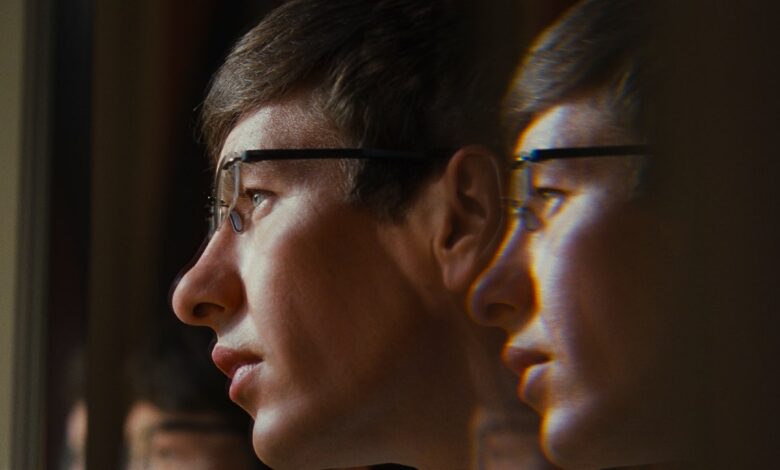Saltburn Is Stylish and Intriguing, With Barry Keoghan In Full Command

Writer-director Emerald Fennell’s blazing, blaring debut feature, 2020’s Promising Young Woman, presented a kicky setup—a traumatized woman getting revenge on predatory men by faking helplessness and waiting to pounce when they try to take advantage of her—but eventually lost its narrative way. Though she won a screenplay Oscar for her troubles, Fennell couldn’t figure out a satisfying way to land the plane.
For much of Fennell’s new film, Saltburn, we feel we are in steadier, more confident hands. This time, Fennell’s premise is less reliant on zeitgeisty social commentary, which relieves some of the pressure that Promising Young Woman, in all its #MeToo alertness, buckled under. We’re back in the early 2000s at Oxford, that furnace of intellect, wealth, and on occasion wealthy intellect. Familiar characters are introduced: Oliver (Barry Keoghan) is a shy nerd from a troubled, decidedly un-monied background while beautiful golden god Felix (Jacob Elordi) is the scion of a noble family. Felix is louche and alluring to all around him, but perhaps especially to lonely Oliver, who casts furtive glances Felix’s way but otherwise remains a distant admirer.
Until, of course, a chance encounter, and suddenly Oliver is swept up in Felix’s intimate attention. Fennell teases at the implied queerness of this collegiate dynamic, letting it hang in the air as, perhaps, one of the film’s great questions. A character plainly states the literary allusion, but they needn’t have: everything about Saltburn, at this point, is an obvious modernization of Brideshead Revisited, Eveyln Waugh’s great novel of money and desire and burbling homoeroticism.
That becomes glaringly clear when Oliver is invited to spend the summer at the country manor—castle, really—where Felix’s family spends their days languid and blithely snobby, indulging in drink and cigs (and no doubt other things) while they regard Oliver with a wary curiosity. The Oxford stretch of the film is nervous and sad, but once Oliver arrives at the ludicrous Saltburn estate, Fennell turns up the comedy. Oliver’s early days at Saltburn are a wry, increasingly sinister delight, made all the more so by Rosamund Pike’s sharply amusing turn as Felix’s ice-queen gorgon of a mother, who states—as if it is psychiatric fact—that she has an innate revulsion to ugliness.
She’s glad, then, to see that Oliver, slouched and blandly dressed as he is, has some sort of dark beauty in his eyes. Keoghan, a rising Irish actor who here puts his magnetic oddness to good use, makes us believe that these haughty sophisticates could indeed see something worth ferreting out of Oliver. Sure enough, he proves, rather quickly, to the manner born. He falls in with Felix and his sister Venetia (an appropriately purring and unstable Alison Oliver) as they read Harry Potter books and lounge by the water—they also play drunken tennis in formalwear, naturally—while keeping Felix’s sneering gay American cousin, Farleigh (Archie Madekewe), at a safe enough distance.
Some kind of game is being played here, but Fennell is coy about exactly what that is. Are Felix and his cohort (which also includes the lord of the manor, played as a rich dullard by Richard E. Grant) ensnaring Oliver in some kind of trap? He’s a toy to be played with for sure, but to what end? Gradually, though, it seems that Oliver might have the upper hand, that he is a much more capable calculator than anyone, including us in the audience, have given him credit for.
Fennell has fun with these wicked possibilities, letting her actors flounce and skulk around in between jags of crackling, clever dialogue. It’s a pleasure to be in the company of these noxious people, all looking resplendent in the film’s shadowy lighting and artfully composed tableaux. (The film is, somewhat unnecessarily, presented in a square aspect ratio, as has become a tiresome trend in the last ten years.) The period setting made me nervous at first—I dreaded how many knowing, “rememberthis cultural object from the aughts?” winks we would be made to endure—but Fennell makes references sparingly.
A few old tunes come wafting out of Millennial post-adolescence (MGMT’s “Time to Pretend” is one of them, duh) and we see the family watching The Ring and Superbad. Otherwise, though, Fennell does not force us to consider the film’s time. It’s place that she’s more concerned with, this ominous Eden where Oliver is stepping into the full bloom of his being—whether that is a newly self-assured, benevolent observer or a shrewd machinator.




